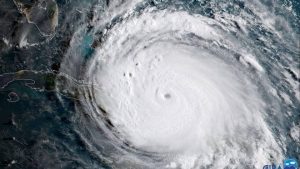By: Felipe Rivas

2 min read May 2020—A few days shy of the official start of the 2020 hurricane season and the Southeast has already seen two named tropical storms. Tropical Storm Arthur brought inclement weather to the Carolinas a full two weeks before the June 1 start date and on Wednesday Tropical Storm Bertha formed quickly in the morning and drenched South Carolina before dissipating to a depression, all in a day’s notice.
As the country reels from the devastating effects of the coronavirus, states on the East Coast can expect an above-normal Atlantic hurricane season, according to forecasters with the National Oceanic and Atmospheric Administration’s Climate Prediction Center, a division of the National Weather Service. States like Georgia, Florida and the Carolinas can expect a 60 percent chance of having an above-normal hurricane season with a likelihood of three to six major hurricanes making landfall. The Atlantic hurricane season runs from June 1 to Nov. 30, peaking in August and September.
The 2020 Atlantic hurricane season is expected to have 13 to 19 named storms, six to 10 hurricanes, and three to six major hurricanes, according to the National Weather Service. As states juggle coronavirus-related safety concerns with the reopening of their economies, state leaders urge residents to begin their preparation and evacuation plans early while emphasizing the importance of hygiene and keeping in mind social distancing measures. “This early season storm reminds us that we always need to be prepared for severe weather,” North Carolina Emergency Management Director Mike Sprayberry said during the formation of Tropical Storm Arthur, which set off tropical storm warnings along the North Carolina coast from Surf City north to Duck. “The time to prepare is now,” Sprayberry said.
COVID-19 may put a damper on the way residents traditionally prepare for the months-long season. “Social distancing and other CDC guidance to keep you safe from COVID-19 may impact the disaster preparedness plan you had in place, including what is in your go-kit, evacuation routes, shelters and more. With tornado season at its peak, hurricane season around the corner, and flooding, earthquakes and wildfires a risk year-round, it is time to revise and adjust your emergency plan now,” said Carlos Castillo, acting deputy administrator for resilience at FEMA, according to the National Weather Service. “Natural disasters won’t wait, so I encourage you to keep COVID-19 in mind when revising or making your plan for you and your loved ones, and don’t forget your pets.”
In Florida, a magnet for constant hurricane activity throughout the season, leaders are strategizing on how to contain the spread of COVID-19 in the midst of a hurricane threat. “We don’t know how the virus is going to react as we move into these various stages,”Gov. Ron DeSantis said at a news conference in Sarasota, according to the U.S News & World Report. “We don’t know what it’s going to look like a month from now, three months from now, but we have to assume that it’s going to be with us in some capacity, so how do you deal with hurricane issues?” he said.
Days before the official start to hurricane season, Florida has reported more than 52,000 cases of the coronavirus and more than 2,300 deaths, according to the Johns Hopkins University & Medicine’s Coronavirus Resource Center. “This virus really thrives and transmits when you have close sustained contact with people inside an enclosed environment,” DeSantis said. “As you’re looking at sheltering for a hurricane, you have to keep that in mind. If you pile people into a place, under normal circumstances that may be fine, but that would potentially allow the virus to really spread if somebody is in fact infected,” he said.
Florida leaders are working with the Federal Emergency Management Agency on changes to sheltering and evacuation procedures to account for the coronavirus implications. Florida emergency management Director Jared Moskowitz said those changes could include shelters that only accept people infected with the coronavirus, or shelter in place orders depending on the strength of the building and magnitude of the storm. “We’re going to do more non-congregate sheltering instead of mass congregate sheltering,” Moskowitz said.
In similar fashion, Georgia leaders and the Georgia Emergency Management Agency urged all Georgians to prepare and follow activity in the tropics. Tropical Storm Arthur did not cause too much impact as it curved away from the Peach State while traveling through the Atlantic Ocean. Though unfazed by Tropical Storm Arthur, Georgia has dealt with severe weather conditions since the start of the spring. In March and April, Georgia experienced heavy rainfall and severe flooding in more than 100 counties while also dealing with the aftermath of the coronavirus. In March, Gov. Brian Kemp signed an executive order declaring a state of emergency for 120 Georgia counties south of I-20. “The state is working to ensure counties impacted by flooding across Georgia have access to all the resources necessary to respond,” Kemp said at the time. “I encourage residents to listen to their local officials and news sources and heed the directions of their local emergency management officials,” he said.
To learn more, visit:
https://www.noaa.gov/media-release/busy-atlantic-hurricane-season-predicted-for-2020
ReadyNC.org
